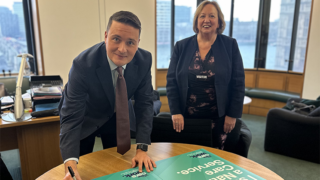British households are facing a financial crisis, with living standards set to see the biggest drop in 50 years. But the cost of living is not the only thing on the up: the cost of working is getting more expensive too.
There are rising costs for simply doing your job – whether it’s the commute, childcare, using a vehicle for work, car-parking or taxes and, after more than a decade of real-terms pay cuts, public sector workers are being left seriously out of pocket.
Today, the cost of working will increase significantly for millions of workers across the UK. If you work and earn over £9,880 per year, you pay national insurance (NI), which increases by 1.25% today. Slimmer pay packets, combined with rising costs of pretty much everything, will feel very difficult for UNISON members.
The NI rise was announced last autumn as part of the government’s plan to raise billions for the NHS and social care. But there are much fairer ways to raise the extra cash, without leaving 29 million workers worse off.
How about a windfall tax on profits made by big energy companies, or clawing back the billions of pounds given away by the government in dodgy contracts throughout the pandemic?
This tax increase is only one extra pressure on the cost of working. Families can’t work without childcare and, as parents face higher childcare costs, mothers are far more likely to stay at home because going to work is just unaffordable. There are 870,000 stay-at-home mothers who want to go back to work but can’t afford to.
Simply getting to work by public transport gets more expensive every year. Fares keep going up, and passengers are paying for the biggest rail fare increase in nine years.
Driving to work is becoming almost unaffordable because of soaring petrol and diesel prices, and even parking charges on-site at hospitals, local councils and universities are increasing, with free car parking for NHS staff in England ending just a few days ago.
Workers who use their own car for duties are going home out of pocket each day. Despite prices at the pumps spiralling out of control, HMRC mileage rates haven’t been adjusted for over a decade and don’t cover the petrol costs for site visits.
What are the potential risks of this? Care workers not being able to make home visits, environment officers unable to protect communities from flooding and pollution, vulnerable children not getting a visit from their social worker, or community healthcare staff not getting to people when they need help.
And even for those working from home, because their employer has closed or slimmed-down office spaces, household energy and broadband costs will make life much more difficult.
There’s no escaping the rising cost of living, and working, for millions of workers in the UK and it has been compounded by over a decade of austerity in public services, and real terms pay cuts. This government needs to get a grip and start making political choices that help workers, rather than punishing them.
Public sector workers need a wage rise that outstrips inflation, the government’s energy strategy needs to sort out spiralling costs, and the chancellor needs to look again at the impact of his NI tax hike and reviewing mileage rates.





